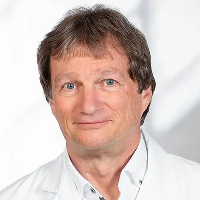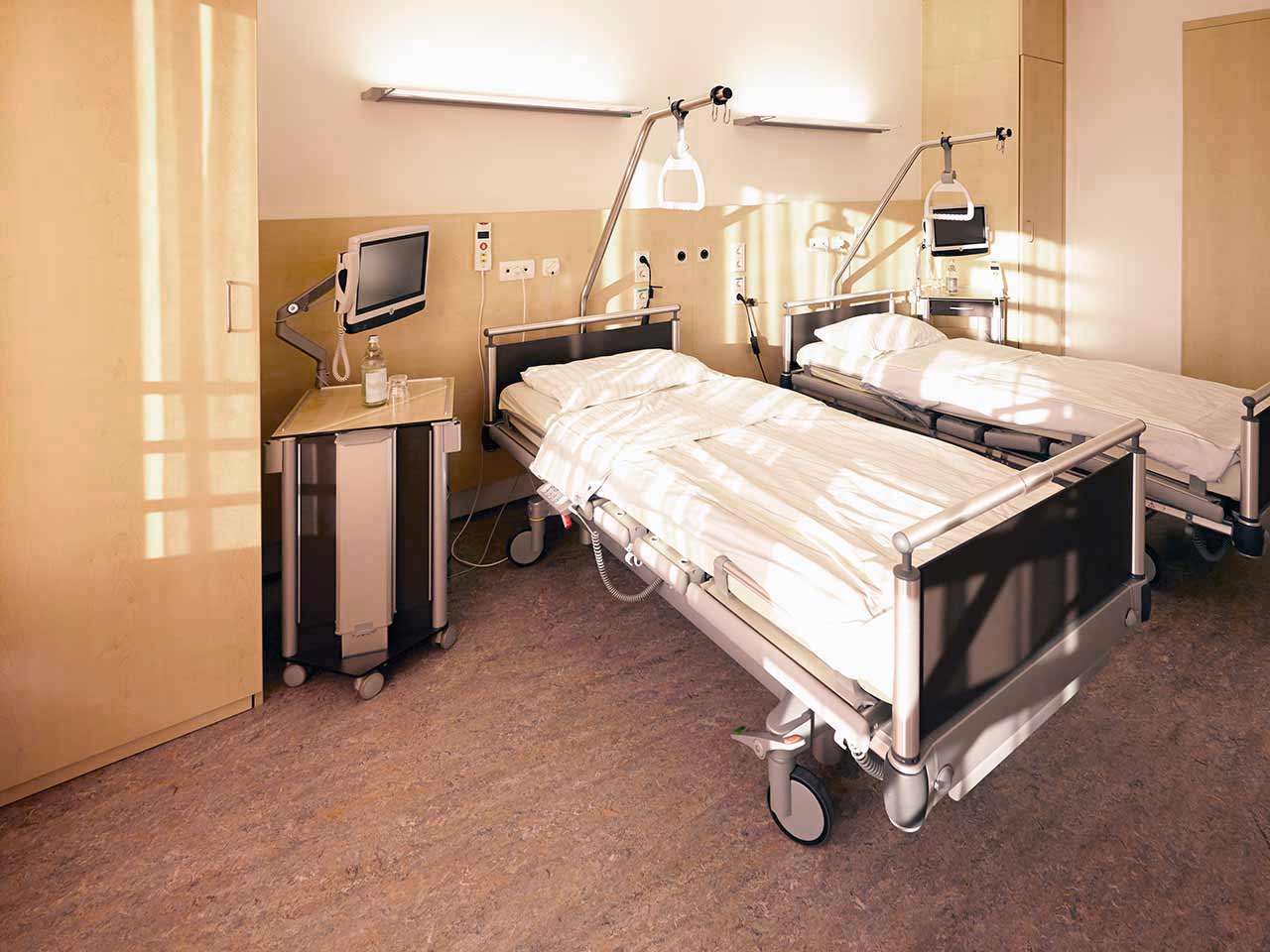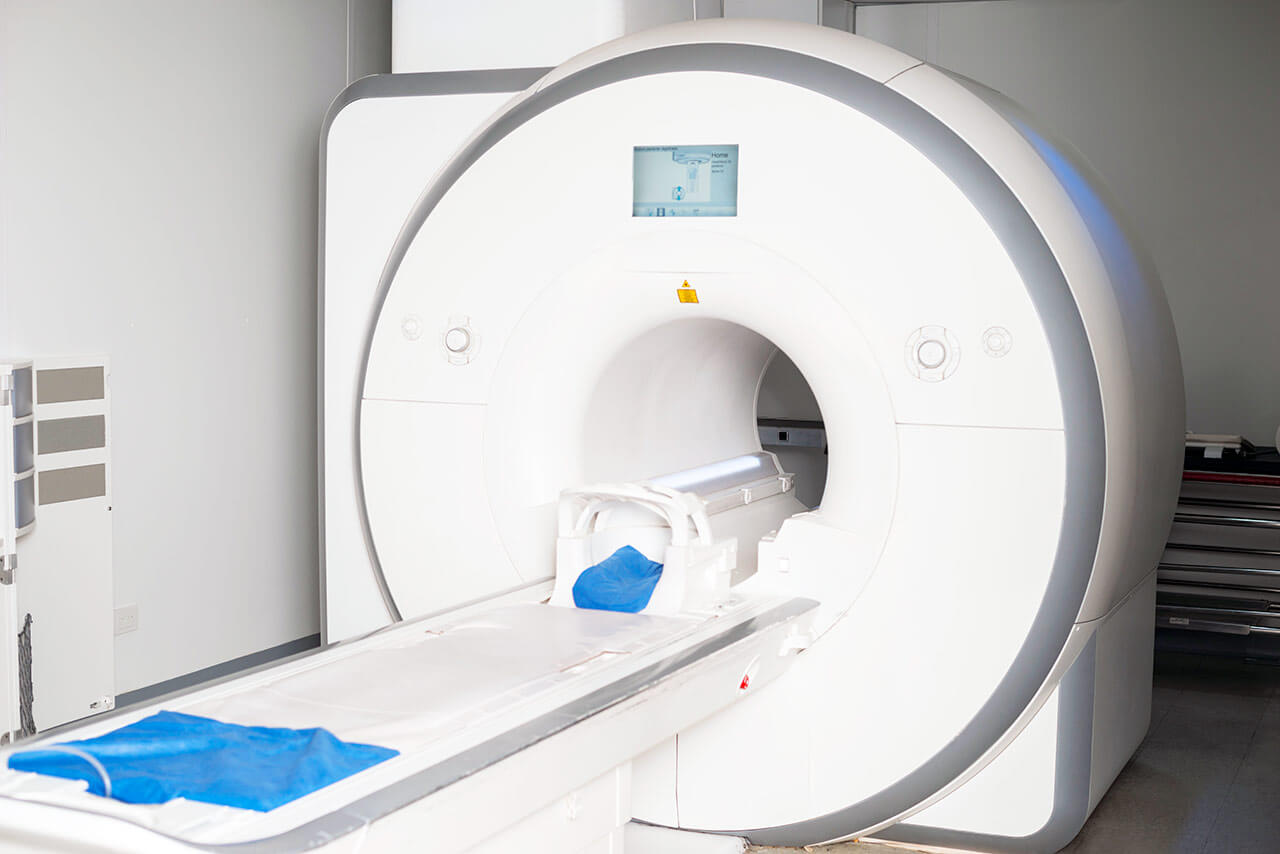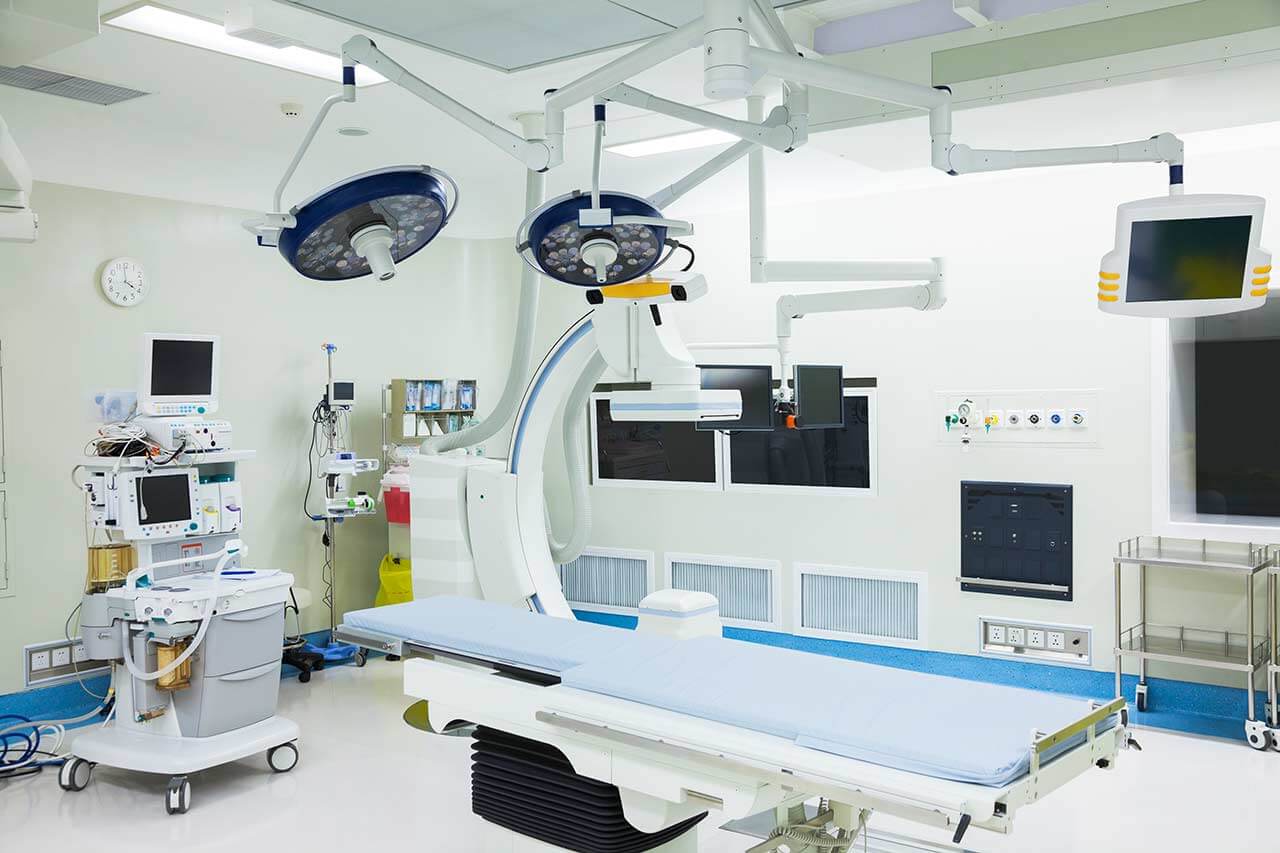
The program includes:
- Initial presentation in the clinic
- clinical history taking
- physical examination
- review of medical records
- laboratory tests:
- complete blood count
- general urine analysis
- biochemical analysis of blood
- TSH-basal, fT3, fT4
- tumor markers (AFP, CEA, СА-19-9)
- indicators of inflammation (CRP, ESR)
- indicators blood coagulation
- abdominal ultrasound
- gastroscopy with biopsy
- analysis of hp (helicobacter pylori)
- CT/MRI abdomen
- preoperative care
- complete resection of the stomach and further
plastic of intestinal tissue - histologically and immunohistochemically
examination of the remote tissues - symptomatic treatment
- control examinations
- the cost of essential medicines and materials
- nursing services
- nutrition recommendations
- full hospital accommodation
- explanation of future recommendations
Service
You may also book:
 BookingHealth Price from:
BookingHealth Price from:
About the department
The Department of General and Abdominal Surgery, Endocrine Surgery, Colorectal Surgery, Hepatopancreatobiliary Surgery, Hernia Surgery, Bariatric Surgery and Thoracic Surgery at the Nuremberg Hospital provides all modern treatment options in the areas of its specialization. The department's team of general and abdominal surgeons performs operations for stomach, esophageal, small, and large intestine diseases, as well as bone and soft tissue sarcomas. In the field of colorectal surgery, special attention is given to the surgical treatment of rectal neoplasms, hemorrhoids, anal fistulas, and anal abscesses. The department's hepatopancreatobiliary surgeons specialize in surgery for liver, pancreatic, and gallbladder diseases. The department also offers hernioplasty for patients with inguinal and umbilical hernias, anterior abdominal wall hernias, and diaphragmatic hernias. In addition, the department has vast experience in bariatric surgery for morbid obesity. The department also has a team of thoracic surgeons who successfully perform operations for lung, tracheal, pleural, mediastinal, and diaphragmatic diseases. The team of about 50 specialists takes care of the patients' health. More than 4,170 inpatients and over 2,860 outpatients receive medical care here annually. The Head Physician of the department is Dr. med. Ulrich Linnemann.
General and abdominal surgery are integral parts of the work of the department's physicians. A special focus in this area is on surgery for stomach cancer. This oncological pathology is a malignant neoplasm that develops in the gastric mucosa cells. Stomach cancer has 4 stages: early stages are well treated, and as stomach cancer progresses, the malignant tumor invades adjacent organs and affects lymph nodes. Patients with advanced stomach cancer require intensive treatment, which is often based on surgery. The department's abdominal surgeons are highly experienced and brilliantly perform even the most complex resections. The extent of surgery depends on the stage of the oncological process. Subsequently, for localized tumors, resection of the neoplasm with partial preservation of the stomach is usually sufficient, and in cases of metastatic cancer, total removal of the organ is required. The department's surgeons strive to use minimally invasive laparoscopic techniques, which contribute to the rapid recovery of the patient in the postoperative period. As a rule, conservative methods are necessarily added to the stomach cancer treatment regimen, including chemotherapy, targeted therapy, immunotherapy, radiation therapy, etc.
The department employs an experienced team of colorectal surgeons specializing in the treatment of rectal, bowel, and anal pathologies. These specialists perform over 500 surgical interventions annually, and they are therefore rightfully proud of their vast experience and professional skills. The department's surgeons most often perform operations to treat colon cancer, diverticular disease, inflammatory bowel disease (Crohn's disease and ulcerative colitis), hemorrhoids, anal fistulas, anal abscesses, fecal incontinence, pelvic organ prolapse, and rectal prolapse. Many surgical interventions for the above-mentioned diseases are performed on an outpatient basis. In addition, almost all operations are performed using minimally invasive techniques through small skin and soft tissue incisions. With appropriate indications, doctors may also perform a robot-assisted surgical procedure using the da Vinci surgical system. During such a surgical procedure, experienced surgeons control robotic arms, which execute commands with the utmost precision.
The department's team of hepatopancreatobiliary surgeons is responsible for performing operations to treat liver, pancreatic, gallbladder, and biliary tract pathologies. Their focus is on patients with malignant diseases of these organs. The optimal type of intervention is determined depending on the size of the tumor. This may be a local tumor resection or a radical intervention involving the removal of the part of the affected organ, such as a partial liver resection or total gallbladder removal (cholecystectomy). These surgical procedures are performed using laparoscopic techniques, and robot-assisted surgical techniques are also widely applied.
The department also successfully performs hernia repair, including surgery for umbilical, inguinal, diaphragmatic, femoral, incisional hernias, and so on. A hernia is a protrusion of an organ or its part from the abdominal cavity under the skin through a natural opening. Hernias do not respond to conservative treatment, so when this diagnosis is made, surgery is inevitable. The department's specialists perform all hernia repair surgical procedures using minimally invasive techniques, which eliminate the extensive traumatic skin and soft tissue incisions that may cause serious health risks. For the prevention of hernia recurrence, the department's surgeons implant a special mesh during the intervention, which securely holds the organs in their proper place.
The department performs the full range of modern bariatric interventions, which are indicated for patients with morbid obesity. Many people believe that being overweight is a purely aesthetic problem, but obesity also carries enormous health risks. Bariatric surgery is a last-line treatment when diet therapy, physical exercises, and behavioral therapy do not yield the desired results. The department's surgeons specialize in gastric banding, gastric bypass surgery, sleeve gastroplasty, biliopancreatic diversion, and intragastric balloon placement. Only minimally traumatic laparoscopic techniques are used during surgical treatment. All surgical procedures allow for reducing the volume of the stomach so that a person consumes a small portion of food at a time and does not feel hungry. The result is relatively rapid weight loss. Following bariatric surgery, patients are recommended to regularly engage in physical exercises, which will help them consolidate the achieved outcomes.
Another area of the department's competence is thoracic surgery. Doctors of this specialty are engaged in the surgical treatment of lung, mediastinal, pleural, and tracheal diseases. Thoracic interventions of any complexity are performed here, except for a lung transplant. Since 2008, the department has been part of the first Lung Cancer Center certified by the German Cancer Society (DKG). The department undergoes repeated certification every year, demonstrating the highest level of surgical excellence. The department's thoracic surgeons perform more than 1,000 interventions annually, which rightfully reflects their unique experience in the treatment of respiratory diseases. The primary focus of the department's specialists is the surgical treatment of lung cancer and lung metastases. It is noteworthy that more than 80% of lung cancer surgeries are performed in the department using endoscopic techniques. Advanced laser devices are also successfully used to remove lung metastases.
The department's range of services is complemented by surgery for endocrine diseases, including the thyroid gland, parathyroid glands, and adrenal glands. The department's endocrine surgeons offer patients minimally invasive and sparing treatments. Surgical microscopes and neuromonitoring techniques are used during thyroid surgery to prevent damage to the recurrent laryngeal nerve, which may lead to voice loss. Endocrine surgeons cooperate closely with endocrinologists and specialists in nuclear medicine, which guarantees a comprehensive approach to the patients' problems.
The department's clinical focuses include:
- General and abdominal surgery
- Surgery for stomach cancer
- Surgery for esophageal cancer
- Surgery for colon cancer
- Surgery for bone and soft tissue sarcomas
- Endocrine surgery
- Surgery for thyroid diseases
- Nodular goiter
- Thyroiditis
- Thyroid cancer
- Surgery for parathyroid diseases
- Primary and secondary hyperparathyroidism
- Surgery for adrenal diseases
- Benign and malignant tumors
- Surgery for thyroid diseases
- Colorectal surgery
- Surgery for colon cancer
- Surgery for diverticular disease
- Surgery for inflammatory bowel disease (Crohn's disease and ulcerative colitis)
- Surgery for hemorrhoids
- Surgery for anal fistulas and abscesses
- Surgery for fecal incontinence
- Surgery for pelvic organ prolapse
- Surgery for rectal prolapse
- Hepatopancreatobiliary surgery
- Surgery for liver cancer and liver metastases
- Surgery for pancreatic cancer
- Surgery for gallbladder cancer
- Surgery for gallstone disease
- Hernia repair surgery
- Surgery for inguinal hernias
- Surgery for umbilical hernias
- Surgery for diaphragmatic hernias
- Surgery for femoral hernias
- Surgery for incisional hernias
- Surgery for anterior abdominal wall hernias
- Bariatric surgery
- Gastric banding
- Gastric bypass surgery
- Sleeve gastroplasty
- Biliopancreatic diversion
- Intragastric balloon placement
- Thoracic surgery
- Surgery for lung cancer and lung metastases
- Surgery for mediastinal tumors
- Surgery for emphysema
- Surgery for tracheal diseases
- Surgery for inflammatory lung diseases
- Surgery for pleural diseases
- Surgery for chest tumors, malformations, and injuries
- Surgery for diaphragmatic diseases
- Other surgical services
Photo of the doctor: (c) Klinikum Nürnberg
About hospital
According to the reputable Focus magazine, the Nuremberg Hospital ranks among the top German medical facilities!
The hospital is one of the largest, highly specialized medical centers in Europe and positions itself as the maximum care hospital. The healthcare facility is an academic hospital of the Paracelsus Medical University in Nuremberg. It houses 42 departments, institutes, and highly specialized centers focusing on various medical fields. All the hospital's employees work hand in hand for the benefit of their patients. The specialists strive to provide top-class medical care for every patient. Moreover, the medical team always shows a humane attitude and understanding towards the patient's life situation, making every effort to support them during the entire therapeutic process.
The total number of beds in the hospital is 2,233. The medical team consists of more than 8,400 employees, including many world-famous doctors and professors who had their clinical training at the best medical facilities in Germany, other European countries, and the USA. The hospital admits more than 100,000 inpatients and more than 170,000 outpatients annually. The number of patients who come to the hospital steadily increases every year, which is the best confirmation of its high standards and outstanding treatment results.
The cornerstone of successful clinical practice is state-of-the-art technical infrastructure. The hospital offers its patients innovative technologies such as the Da Vinci surgical system, devices for stereotactic procedures, intraoperative radiation therapy, angiography, PET CT devices, high-intensity focused ultrasound, 64-slice CT scanners, and other advanced medical devices. The combination of cutting-edge technical facilities and the high competence of the physicians allows for the provision of effective treatment even in the most complex cases.
The Nuremberg Hospital is undoubtedly one of Germany's leading medical facilities, where patients benefit from modern infrastructure, precise diagnostics, effective treatment, and responsive care.
Photo: (с) depositphotos
Accommodation in hospital
Patients rooms
The patients at the Nuremberg Hospital live in comfortable single and double rooms. Each patient room is equipped with an ensuite bathroom with a shower and a toilet. Standard rooms include an automatically adjustable bed, a bedside table, a wardrobe for storing clothes, a table and chairs for receiving visitors, a TV, and a radio. The hospital also offers Wi-Fi.
If desired, patients can live in enhanced-comfort rooms. Such patient rooms are more spacious, and their furnishings correspond to the level of an upscale hotel.
Meals and Menus
The patients at the hospital are offered tasty and balanced meals three times a day: breakfast, lunch, and dinner. The patients have a daily choice of three dishes for lunch and dinner, while breakfast is served as a buffet.
If, for some reason, you do not eat all foods, you will be offered an individual menu. Please inform the medical staff about your food preferences prior to treatment.
Further details
Standard rooms include:
Accompanying person
Your accompanying person may stay with you in your patient room or at the hotel of your choice during the inpatient program.
Hotel
You may stay at the hotel of your choice during the outpatient program. Our managers will support you for selecting the best option.





